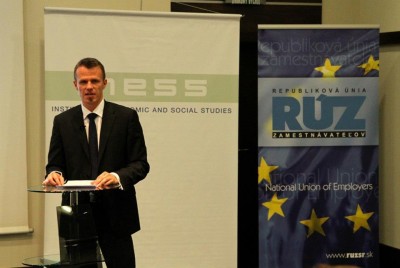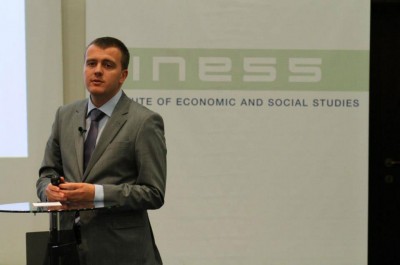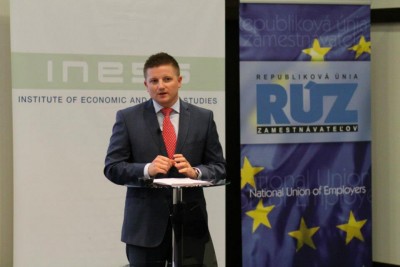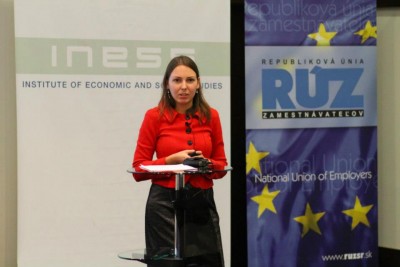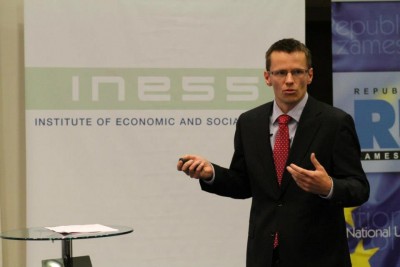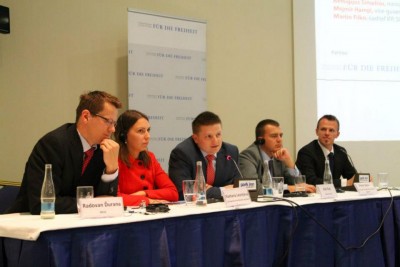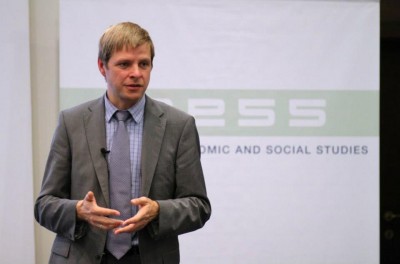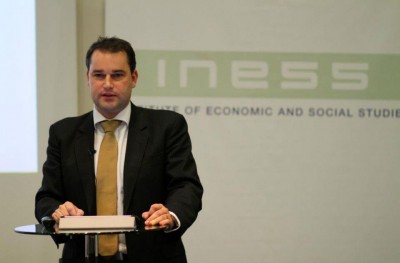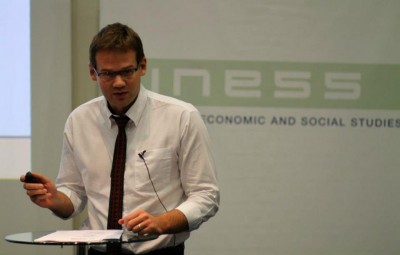On October 9, 2012 INESS with support of the Friedrich Naumann Foundation for Freedom and the National Union of Employers organized international conference under the title Cutting Deficits, which was a continuation of INESS’ annual traditional conference devoted to public finances.
Two panels with seven speakers from four European countries took place in a Park Inn Danube hotel in Bratislava. The speakers answered in various ways the main question of the conference – Is it possible to consolidate public finances on the expenditures side, and how?
Conference started with expert panel, moderated by INESS director Richard Ďurana. Petar Ganev from Bulgarian Institute for Market Economics was first to speak. He presented efficiency of his country in reforming public finances to the audience of more than 100 guests. Bulgaria experienced budgetary surplus, 10% flat tax and fiscal reserves, through which today it can finance deficit. But even Bulgaria didn’t avoid problems with budget, lacking social reform or government’s efforts to consolidate, especially on the revenues side.
Aleš Rod from the Liberalni Insitute presented the situation in Czech Republic. Contrary to the fact that the current Czech government presents itself as right-wing and pro-market, its applied solutions to the difficult budgetary situation isn’t very different from what leftist governments of other countries promote. While Czech taxpayers were affected gradually by almost twenty cases of tax increase, Czech government tightened its belt only in theoretical and rhetoric sense.
Kaetana Leontjeva from Lithuanian Free Market Institute showed in her presentation that also Lithuanian government chose the way of increasing taxes. This led to quick growth of grey economy and revenues from the taxes dropped below expectations. Government reacted with decreasing some of the taxes on the previous level and reductions online casino in some of expenditures. Ms. Leontjeva concluded that also this Baltic country should focus on systematic changes in spending.
Radovan Ďurana from INESS was closing the expert panel. His lecture showed the crisis’ impact on the public finances, which observed sharp fall A horoscope for leo man can be the sincerest and the most generous lover and admirer. in case of revenues, but only slight slowdown of the growing trend on the side of expenditures. In Slovakia the word saving translates mainly into freezing and postponing expenditures. The main source of the public finance misbalance is the unsustainable social system, without its reform the consolidation of the public finances in the next couple of years will be impossible.
After a short discussion with the audience, political panel followed. The initial speech was delivered by Lithuanian Minister of Justice Remigijus Šimašius. He presented all the options which an executive can use to balance a budget. They aren’t many, actually there are just six main steps, out of which only half is economically beneficial.
Vice-governor of the Czech National Bank Mojmír Hampl presented current situation from the international perspective. There was not very optimistic conclusion that the International Monetary Fund, which officially was set up by the rich Western countries to help the developing world, ended up saving mainly developed European countries today.
At the end Martin Filko, director of the Institute for Financial Policy of the Ministry of Finance, presented the view of the Slovak government and its analysts on the budgetary situation. After the technical introduction from the economic theory point of view on the influence of various consolidation steps on the GDP growth and unemployment he presented technical details and methodology, which is used by IFP while designing the measures.
The conference was attended by many distinguished guests, from MPs and Ambassadors to representatives of industry, academic institutions, the third sector and media. We believe that this conference contributed to our long-term effort to inform Slovak public about current situation of the public finances and the solutions offered.
Presentations and video from the conference:
Richard Ďurana – opening
Petar Ganev video
Aleš Rod video
Kaetana Leontjeva video
Radovan Ďurana video
Discussion after the expert panel – video
Remigijus Šimašius video
Mojmír Hampl , text form video
Martin Filko (presentations updated with the official numbers) video
Discussion after the political panel – video




